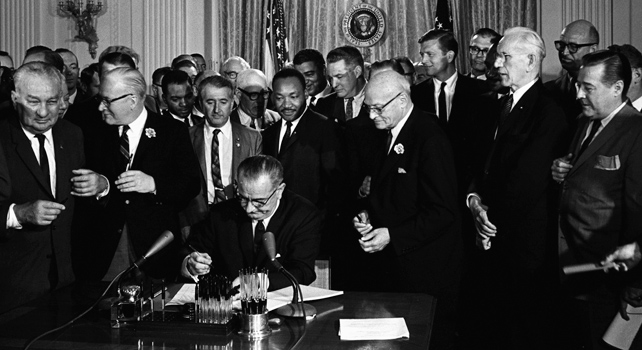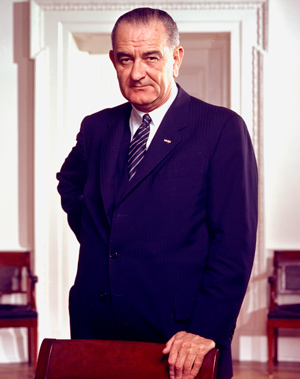
Since 1982, historian Robert Caro has been chronicling the life of the 36th President of the United States, Lyndon B. Johnson. The first three volumes of the Years of Lyndon Johnsonseries were met with wide acclaim.
The third volume, Master of the Senate, won the Pulitzer Prize in 2003. Now, Caro has released volume four: The Passage of Power, which focuses on Johnson in the immediate aftermath of the Kennedy assassination in November 1963. Fast Company recently spoke with Caro, who said that one of the best ways to understand leadership is to observe leaders “during their most intense struggles, when they have to use every resource available."
"In the moments following the Kennedy assassination, every one of the resources of the presidency was not only visible, but because they were being used to the utmost, they can be observed in all their facets,” Caro says.
Here, Caro helps us parse four key leadership lessons from Johnson’s actions in the days that followed the assassination.
1. Preserve Stability And Continuity
The Kennedy assassination was one of the first national crises to unfold on live television. As a result, by the time Johnson’s plane from D.C. arrived in Dallas, the vast majority of the American public already knew what had happened. Rumors of conspiracies involving Mexico and Castro were already beginning to fly.
“Johnson has to settle the country down,” Caro says. “He has to create an impression of continuity and stability. He has to make clear that the government is functioning--even though its leader had been suddenly killed.”
As part of this strategy, one of the first decisions Johnson made was to keep Kennedy’s staff and cabinet members in place. “That’s very hard to do, because they disliked him," Caro says. "In many cases, they actually had contempt for him.”
While all of Kennedy’s men had initially agreed to stay on through the funeral, many of them were planning to leave shortly thereafter. Knowing this--and realizing the implications of a mass exodus--Johnson began a campaign to entice the staff to stay on. Johnson met with each individual and told him, “I need you more than Kennedy needed you.” But instead of using that same line for each person, Johnson gave each an individual reason that appealed to their particular interests, as to why he needed them to stay.
2. Use The Crisis To Move Forward
On the night after the assassination, Johnson was at home in D.C. He couldn’t sleep. He called three of his aides to his bedroom. He talked to them for hours--without stopping--about what needed to be done, essentially outlining the agenda for the rest of his presidency.
Since he had been an extremely powerful Senate majority leader, Johnson was able to see that Kennedy’s legislative agenda was stalled, and had been stalled since before his death.
As president, Johnson wanted to move on this legislation. The first bill he took up was the Civil Rights Act. Johnson’s advisors expressed concern that taking up civil rights would erode his political capital. Johnson replied to them that if he couldn’t tackle an issue like civil rights as President, “What the hell is the presidency for?” In his first address to the country, Johnson said “Let us continue [the work of Kennedy].” In his book, Caro quotes Johnson later remarking that although Kennedy had died, “his ‘cause’ was not really clear. That was my job. I had to take the dead man’s program and turn it into a martyr’s cause.”

“He used the sympathy engendered by Kennedy’s death to pick up Kennedy’s causes and drive them forward,” Caro tells Fast Company. Although Johnson was always conscious of fact that he was not elected president outright, he refused to let that be an obstacle to carrying out his bold legislative agenda that saw major progress on everything from civil rights to Medicare.
3. Detachment As An Asset
Johnson and Kennedy had a tense and often contentious relationship. While Caro acknowledges that we will never know what exactly Johnson felt personally about Kennedy’s death, it is possible that Johnson’s detachment from Kennedy may have made it easier to handle the crisis. In Dallas, Caro recounts that Johnson stood in the hospital for 45 minutes without any information about the president’s condition before an aide informed Johnson that Kennedy was dead.
“A moment later, another aide, Malcolm Kilduff, appears and he calls Johnson ‘Mr. President’ for the first time.” Caro says, “Right then, Kilduff asks Johnson to make decisions. And Johnson starts making those decisions with great precision.”
From that moment on, Johnson entered a new mode of thinking. Any personal thoughts or emotions needed to be pushed aside in order to lead the nation through a crisis and then some.
4. Big Decisions Have To Be Made Alone
In the White House, Kennedy had stripped Johnson of most of his advisors in an effort to minimize his ability to exert influence over administration affairs. As a result, when Johnson found himself faced with a crisis after the assassination, he had no one with whom to consult. In this period, Caro notes, “One of the remarkable things is how little he relies on his advisors. On the plane going back to Washington, he has just a few aides with him. He really has no staff. He does this all out of his own unparalleled knowledge of government. Johnson decides alone what has to be done. As Senate majority leader, Johnson made the Senate work. Part of that was a result of his decisiveness and his ability to think fast. Johnson had a will to act and a will to decide.”
In his book, Caro quotes Johnson’s words about those days:
Everything was in chaos. We were all spinning around and around, trying to come to grips with what had happened, but the more we tried to understand it, the more confused we got. We were like a bunch of cattle caught in the swamp. There is but one way to get the cattle out of the swamps. And that is for the man on the horse to take the lead, to assume command, to provide direction.
I was that man.
You need to be a member of School Leadership 2.0 to add comments!
Join School Leadership 2.0